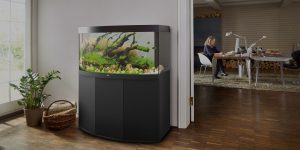The majority of research into the health benefits of interaction between people and pets focuses primarily on animals such as cats and dogs. The benefits here are clear and well-understood, and the use of therapy animals is now widespread. That’s true in both residential care and nursing homes, as well as in hospitals and countless other environments.
Unfortunately, the most common therapy animals and companion species more broadly aren’t always suitable. For example, cats and dogs are rarely suited to residential care and nursing home environments, especially in the long term. In any environment, there’s also the inherent risk of people suffering from allergic reactions.
Benefits of fish tanks in care homes
However, an increasing number of studies worldwide have begun looking at ever-growing evidence that aquariums offer many of the same benefits. Touted benefits include increased relaxation, lower anxiety, reduced diastolic blood pressure, and minimised physiological stress. Other findings include positive effects on mood, pain, and even nutritional intake.




Positive impact on residents with dementia
According to various studies, positive effects on nutritional intake and, with that, body weight were particularly evident within specialised dementia units. Researchers have, therefore, concluded that interacting with fish in aquariums can and does significantly benefit human well-being, especially in settings such as care homes and other similar environments.
Purely in regards to dementia patients, one particular study—Animal-assisted therapy and nutrition in Alzheimer’s disease—further reported that “a tank of colourful, gliding fish … often held patients’ attention for up to 30 minutes – a relatively long time for many [with Alzheimer’s/dementia]”.
The therapeutic value of nature
Elsewhere, there’s also the suggestion that aquariums are particularly beneficial to more elderly individuals in bringing nature’s therapeutic and restorative values indoors. Very specific benefits here include helping to restore depleted cognitive resources and supporting rapid emotional and physiological recovery following stressful events.




Highlights from just one of the numerous reports outlined in the first link featured above, and which is also available on PLOS, include:
- Human-fish interactions may be a viable alternative to more commonly researched forms of human-animal interactions.
- The monetary cost associated with the installation and upkeep of a fish tank is much smaller than that associated with other companion animals.
- The passive nature of viewing fish in an aquarium means that even individuals with limited physical capacity can interact with the animals.
- There are no significant risks from aggression or allergies and fewer risks associated with accidental injury due to the lack of physical contact.
Aquariums outperform other forms of animal therapy
Within residential care and nursing homes, aquariums are a constant feature available to residents at any time and for as long as required. Thus, they provide greater flexibility in exposure than other forms of animal therapy or access to companion animals that rely on visitation programmes.
A systematic review from the world’s largest biomedical library
Further information, including over 100 sources, is available via the U.S. National Library of Medicine, courtesy of ‘The effects of interacting with fish in aquariums on human health and well-being: A systematic review‘. The National Library of Medicine is the world’s largest biomedical library and plays a significant role in America’s National Institutes of Health.
Over 30 years of findings
It’s important to point out that these aren’t all brand-new findings, either. The systematic review linked above refers to a study from 1990 titled ‘Effects of watching aquariums on elders’ stress’. Here’s a particularly valuable excerpt from the report:
Each viewer [of the aquarium] took particular interest in one or two fish and was often overheard conversing with others about these favourite fish.
DeSchriver, M. M., & Riddick, C. C. (1990). Effects of watching aquariums on elders’ stress.
A social lubricant and catalyst for dialogue
The study from 1990 reveals how it quickly became apparent that aquarium fish acted as a social lubricant. With that, elderly participants who were initially reluctant to interact became more animated, personable, and revealing. Accordingly, researchers reported that the presence of a fish tank served as a catalyst for establishing both an alliance and a dialogue with elderly individuals.
Our experiences right here in Rossendale
Moreover, at Your Aquarium, we’ve seen for ourselves the benefits of aquariums in any number of different environments. These environments include residential care, nursing homes, hospitals, doctors’ waiting rooms, and numerous other places and spaces where relaxation, reduced anxiety, and lowered stress levels are crucial.
It’s worth noting that in each of these environments, staff also benefit from the presence of a fish tank. But with professional aquarium maintenance taken care of, they have none of the worries of cleaning or caring for the tank and its inhabitants, making it a win-win scenario.
Find out how Your Aquarium can help
With that, we’re on hand to help with an array of professional aquarium services. These services include regular and one-off maintenance, aquarium installation, fish tank moving, troubleshooting, and more. Contact us today for a no-obligation chat about how we can help with your aquarium needs across Rossendale and surrounding areas.




We can also help with stocking both new and existing aquariums with fish that we know will benefit and delight nursing home residents. These range from adorable fancy goldfish to characterful catfish, tetras, and oddballs from South America, incredibly colourful cichlid species from the lakes of Africa, and vibrant gouramis, barbs, rasboras, and rainbowfish from as far afield as Indonesia and Australia.






